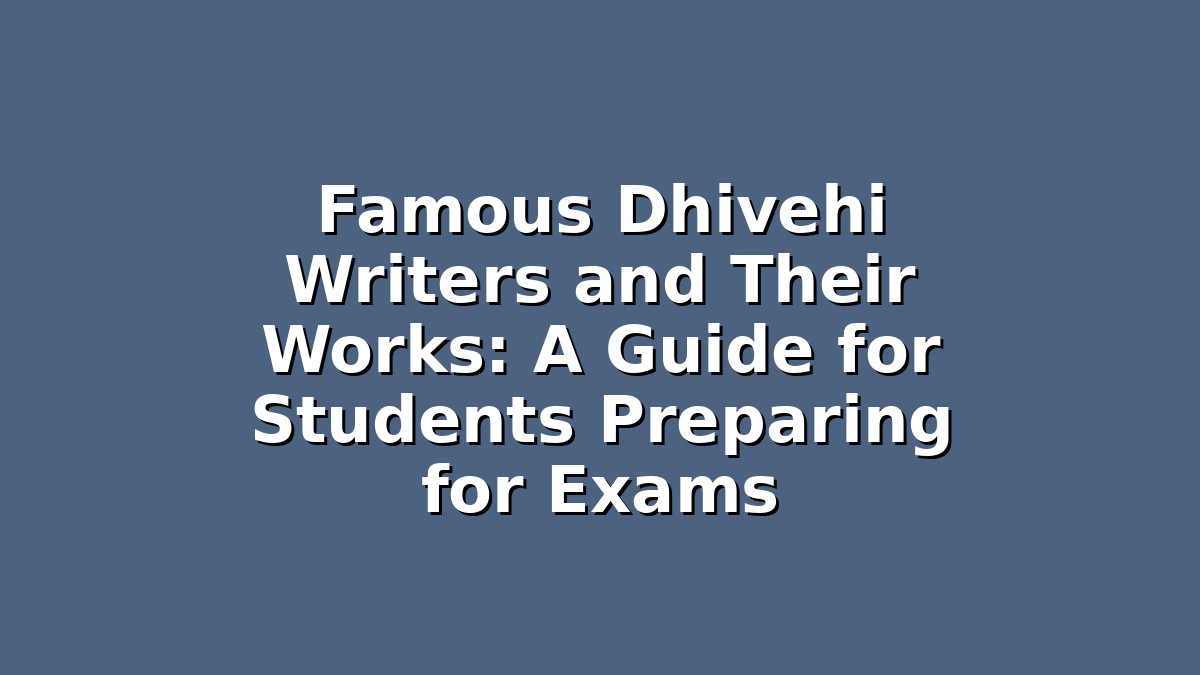Studying literature can sometimes feel overwhelming, especially when you have a whole list of authors and their works to remember. If you are a student preparing for exams or simply looking to improve your understanding of Dhivehi literature, this guide is here to help. Dhivehi literature is rich with history, culture, and unique voices that reflect the Maldivian way of life. By exploring some of the most famous Dhivehi writers and their notable works, you can develop a deeper appreciation of your language and culture, as well as practical strategies to ace your exams.
In this article, we will introduce you to three prominent Dhivehi writers, examine their contributions, and offer study tips to help you absorb the material effectively. Whether you are new to Dhivehi literature or want to polish your exam preparation, these insights will give you a solid foundation.
—
1. Introducing the Pioneers of Dhivehi Literature: Ahmed Shiham and His Impact
Ahmed Shiham is often celebrated as one of the pioneers of modern Dhivehi literature. His poetry and prose evoke the spirit of the Maldives, capturing the beauty of island life and the struggles of its people. His works are frequently included in school textbooks, making them essential for students who want to excel in Dhivehi language exams.
Key Works:
– *“Rawhtha”* (A collection of poems)
– *“Fahudhoo”* (A novel that explores social issues)
Study Tip:
When studying Ahmed Shiham’s poetry or prose, focus on identifying themes such as nature, tradition, and social change. Try summarizing each poem or story in your own words and discuss what emotions or messages the author is conveying. Creating mind maps can be very helpful for visual learners, allowing you to connect characters, themes, and plot points.
—
2. The Versatility of Mariyam Waheedha: Stories that Reflect Society
Mariyam Waheedha is another influential Dhivehi writer known for her short stories and novels that vividly portray Maldivian society, especially focusing on women’s experiences and family dynamics. Her writing style is accessible, making her works popular among school students and literary enthusiasts alike.
Key Works:
– *“Dharaanee”* (Short story collection)
– *“Hithakaanu”* (Novel about love and societal expectations)
Study Tip:
When studying Mariyam Waheedha’s works, pay attention to character development and cultural context. Try to analyze how her stories reflect real-life situations and social norms in the Maldives. For exam preparation, practice answering open-ended questions about the themes and characters, as this will help you develop critical thinking skills and articulate your thoughts clearly.
—
3. Exploring the Modern Voice of Ibrahim Shiham: Contemporary Dhivehi Literature
Ibrahim Shiham represents the voice of contemporary Dhivehi literature. His writing often addresses modern challenges faced by Maldivians, including globalization, environmental issues, and identity. His works encourage readers to think critically about change and adaptation.
Key Works:
– *“Veyru”* (A novel tackling environmental concerns)
– *“Hin’gaa”* (Short stories reflecting youth and modernity)
Study Tip:
To effectively study Ibrahim Shiham’s works, relate the themes to current events or personal experiences. Drawing parallels between the text and the world around you will deepen your understanding and make answers more relevant during exams. Try discussing these works with classmates to gain multiple perspectives and enhance your analytical skills.
—
Practical Study Advice for Dhivehi Literature Students
Understanding the works of famous Dhivehi writers is just the first step. To excel in exams, you need to approach your study systematically:
– Create a Study Schedule: Allocate specific times for reading, note-taking, and revision. Consistency helps retain information better.
– Use Summaries and Annotations: Write brief summaries of each chapter or poem and make annotations about important themes, literary devices, and vocabulary.
– Practice Past Papers: Familiarize yourself with the exam format and typical questions related to Dhivehi literature.
– Discuss and Teach: Explaining the material to friends or family members can reinforce your learning and reveal any gaps in understanding.
– Stay Positive and Take Breaks: Literature can be dense; taking regular breaks and maintaining a positive mindset will keep you motivated.
—
Conclusion
Famous Dhivehi writers like Ahmed Shiham, Mariyam Waheedha, and Ibrahim Shiham have made significant contributions to the literary heritage of the Maldives. Their works offer valuable insights into Maldivian culture, society, and the human experience. By studying their writings with the right techniques and mindset, you can not only prepare effectively for your exams but also develop a lasting appreciation for Dhivehi literature.
Remember, success in literature exams comes from understanding, critical thinking, and practice. Embrace the stories and poems, connect them to your own life and environment, and approach your studies with curiosity and determination. Good luck!
—

Responses